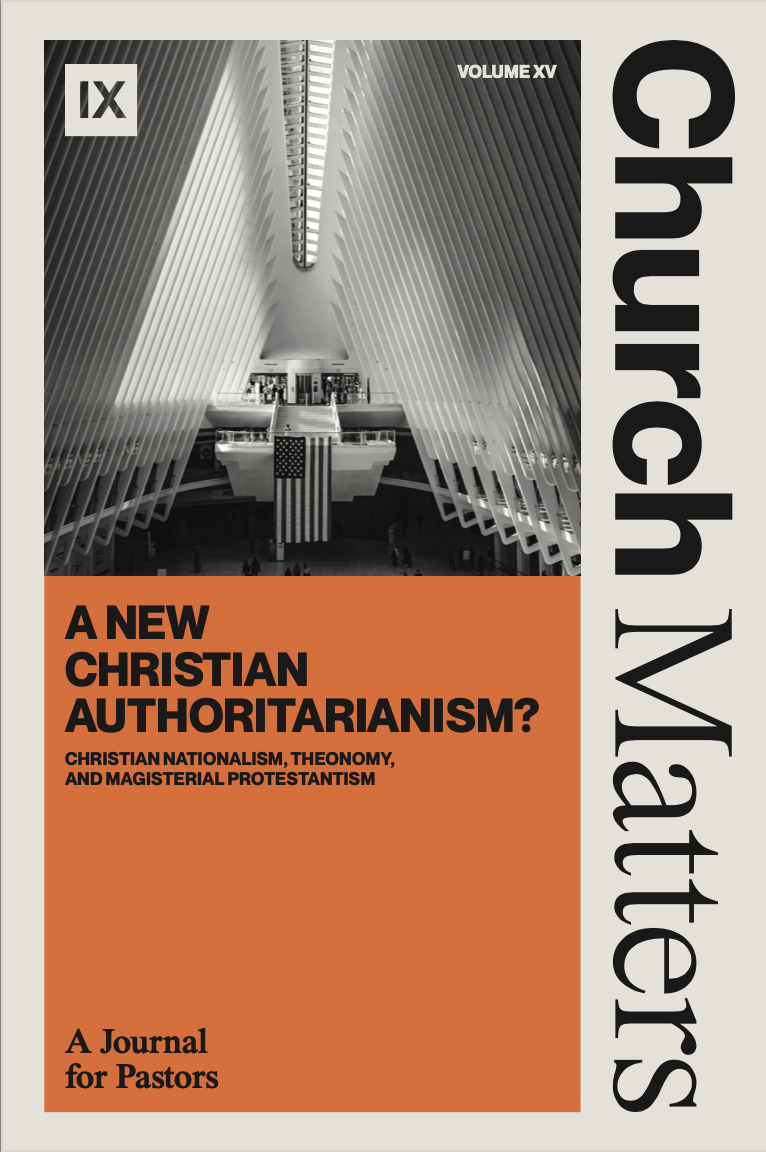Reconstruction Theonomy vs. General Equity Theonomy
Definitions matter. If our definition of “theonomist” is simply “Someone who wants to see God’s rule and law obeyed,” then every Christian would be a theonomist. But discussions about theonomy have something more specific in view: the purpose of government, the proper end of law, and how the Mosaic Law applies to nations and governments today.
Several distinctions can be made among the theonomists of our day.[1] The term “Reconstructionist” describes an older brand of theonomist like R.J. Rushdoony, Gary North, and Greg Bahnsen. “General Equity theonomist” is the name a newer generation of theonomists, including Doug Wilson and James White, give themselves. There are still some Reconstructionist theonomists around today, but it’s the latter whose influence is expanding.
THEIR PLAN
Both Reconstructionists and General Equitists attract evangelicals who bemoan what they perceive as ineffective conservative Christian social engagement. Where the Reconstructionists gained adherents among those tired of dispensational hand-wringing, the General Equitists appeal to Christians disaffected with today’s prevailing models of evangelical cultural engagement, such as James Davison Hunter’s “faithful presence,” Tim Keller’s so-called “third-wayism,” or the popular phrase, “Jesus is neither a donkey nor an elephant.”
Against these, both brands of theonomists argue for a better way. They cast themselves as the few, the proud, the truly reformed who will give “no quarter” to the progressive left or the squishy middle. Their aim is to defeat secularism and its Dispensationalist and Big Eva co-conspirators. Their burden is to construct a society built on God’s law.
Reconstructionists and General Equitists share many assumptions, but their project is not mainly exegetical. Nor is their task to do constructive theology as traditionally understood. Instead, theirs is a comprehensive worldview. They attempt to stand amidst traditional reformed thought and construct a social system that confronts western decadence; it’s not an overstatement to say that their aim is a transformed society.
PRESUPPOSITIONALISM
Such a program rests on certain theological and philosophical commitments. It is presuppositional in epistemology, postmillennial in eschatology, and transformationalist toward culture.
Arguing from presuppositional commitments, they insist there is no ideological neutral ground. You can have autonomy or theonomy. Man can make up his own law or obey God’s law. For them, secular neutrality is a myth, and accepting the lordship of Jesus is a precondition for making truly just laws.
Historically, this stream develops from Calvinistic forms of thought. It comes by way of Abraham Kuyper via Cornelius Van Til, who espoused a form of presuppositional apologetics to counter the prevailing assumptions of modern society. (Van Til argues that only Christians can have true knowledge of themselves and the world and that Scripture is the objective standard for all human thought).[2] The theonomists develop Van Til’s thought and shape it toward political ends. Here’s how Rushdoony puts it:
Basic to this study is the belief that the presuppositions of human thought in every field must be basically one in order to arrive at any concept which validates both biblical faith and human knowledge. The sovereignty of the self-contained God is the key to every field, in that only the God of Scripture makes all things possible and explicable and is thus the basic premise not only of theology, but of philosophy, science, and indeed all knowledge. In that God is the creator of all things, he is their only valid principle of interpretation, in that they derive both their existence and meaning from his creative act.[3]
Rushdoony argues no field can be properly understood, no law rightly shaped, no institution properly built without recognition of God’s law at its center. For Wilson and company, this principle shows up in the institution of government when the lordship of Jesus shows up in our constitution.[4] Such a move articulates a key assumption: the Bible speaks to all human institutions and is the measure of their faithfulness. It’s not merely a matter of making more just laws; the assumptions of the system must be changed. It’s Christ or chaos.
POSTMILLENNIALISM
With a dour view of government, you may expect such men to be pessimistic. But they espouse a hopeful postmillennialism. David Schrock will have more to say about this. But here I’ll mention that such a view has them resist both the cultural pessimism accompanying premillennial and much amillennial theology and a preoccupation with heaven that eschews worldly responsibility.
Theirs is a worldview with a promise. Engage in the fight, join the fray—victory is assured.
These sentiments have wide appeal. Christians are assured victory. But what kind of victory are we promised prior to Christ’s return? Postmillennialists say we’re marching toward the Christianization of the world. Though Christendom is in tatters now, it will be reconstructed, and it’s our responsibility to engage in the fight in particular ways. We may not see ultimate victory in our lifetime, but victory is assured, as our efforts will result in the Christianization of the world and its institutions. Then the end will come.
Such belief establishes confidence. It tempers their rhetoric with resolve. They’re on the winning side. Even though the immediate prospects seem bleak, they don’t waver from their principles, for they know victory is assured along particular lines.
THEONOMY PROPER: THE USE OF THE LAW
Both theonomist streams are transformationalist toward culture. Their aim is to see this world transformed into the kingdom of Christ as its institutions conform to God’s purpose. Christ has claimed every square inch of creation, and the task of Christians is to assert Christ’s rule and reign.
The method for bringing about societal transformation is bringing everyone into obedience of God’s law. Governments ought to objectively acknowledge the supremacy of Christ. Here, to varying degrees, both Reconstructionists and General Equitists see the Old Testament civil law as instructive for society.
But they also diverge at this point.
Reconstructionist Greg Bahnsen in his Theonomy in Christian Ethics argues the Old Testament law, including all the civil (but not ceremonial) elements within the Sinai Covenant, remains valid and authoritative. Interpreting Matthew 5:17–19, Bahnsen says, “Jesus, the awaited Messiah, rectifies the fallen standard of the law; He confirms its exhaustive details and restores a proper conception of kingdom righteousness.”[5] For Bahnsen, Jesus did not come to abolish the Sinaitic law but to confirm it in its exhaustive detail.
General Equity theonomists agree on the abiding significance of the Sinai Covenant. They believe the Old Testament Law exists in part to discipline the nations. But for them, the “general equity” (a term from WCF 19.4 and 1689 LBCF 19.4) of the civil elements of the Mosaic law, meaning, their broadly applicable principles of divine justice, is binding on civil governments.
Both Reconstructionists and General Equity theonomists agree that God has prescribed laws in Scripture that should govern all societies, but they differ on how the law should be interpreted and applied. Reconstructionists offer a detailed plan or provide a system for bringing a nation’s law in line with the Sinai covenant; General Equity theonomists are more ambiguous. The reasons vary. It’s possible these newer theonomists have learned from the mistakes of their predecessors. Bahnsen, Rushdoony, and company’s project splintered into factions.
The General Equitists are more subtle. They have cultivated a movement more than a coherent system of thought. Even their name “general equity” resists tight definition. That God’s law should be obeyed in society is asserted, but what exactly that law is varies. Wilson argues that the Christian task is to baptize and teach the nations all that Jesus has commanded, and what he has commanded included the Old Testament law. But they differ from Reconstructionists on further details. General Equitists attempt to discern the principle at work in the Old Testament civil law and apply it to current laws. They assert there is a right way to order a society, and that is based in part on the civil laws of the Old Testament. Yet their framework is flexible and their application pliable, which allows them to critique various cultural expressions and customs.
Wilson strongly critiques the moral decadence of Western society and argues for better laws. He contends that departing from God’s law has led to chaos. He leaves room for direct action while calling for a long-term approach. He advocates working to transform society through proclaiming the gospel, praying for revival, building churches and schools, and raising families—matters that can gain wide consensus. Wilson is sharpest in his critiques, but it remains to be seen if his version of theonomy offers a constructive alternative that differs from what’s come before. It would seem that his version of theonomy could hypothetically include every civil element within the Sinai Covenant, just like the Reconstructionists. Yet his version is not constrained by the details of that covenant. In that sense, one might almost count him as a biblically unconstrained Reconstructionist. His version can do everything that Sinai does, but more as well.
CONCLUSION: BASIS FOR CRITIQUE
Reconstructionists and General Equitists share many points of overlap. Their plans target similar disaffected people. A transformed society is their goal. Their frameworks are built upon presuppositional and postmillennial commitments, but they differ in the final application of Old Testament law.
Any assessment or critique of such arguments must pay careful attention to these commitments and evaluate their claims along appropriate lines. They must aim to understand the arguments of the theonomists on their own terms. General Equity theonomy resists tight definition, but those who share a concern and attempt to address its weaknesses must establish a common vocabulary and demonstrate where such arguments fail exegetically, theologically, and ethically.
* * * * *
[1] Doug Wilson, “Theonomy is a Many Splendored Thing” accessible here: https://dougwils.com/the-church/s16-theology/theonomy-many-splendored-thing.html.
[2] For a summary of Van Til and his thought, see John Frame, “Conelius Van Til” in Walter Elwell, ed., Handbook of Evangelical Theologians (Grand Rapids: Baker, 1993), 156-67. Also available here: https://frame-poythress.org/cornelius-van-til/.
[3] Rousas John Rushdoony, By What Standard? An Analysis of the Philosophy of Cornelius Van Til, (Vallecito: Ross House Books, 1995) 5-6, Kindle Edition.
[4] Doug Wilson, Empires of Dirt: Secularism, Radical Islam, and the Mere Christendom Alternative, (Moscow: Canon Press, 2016), 160.
[5] Greg Bahnsen, Theonomy in Christian Ethics (Nacogdoches, TX: Covenant Median Foundation, 2002), 88









